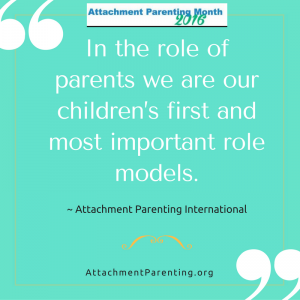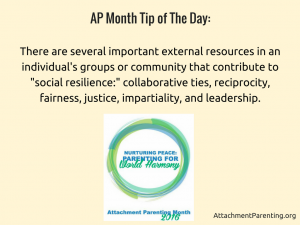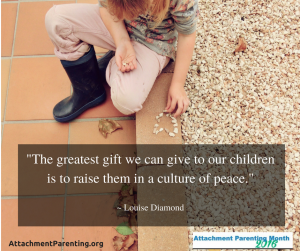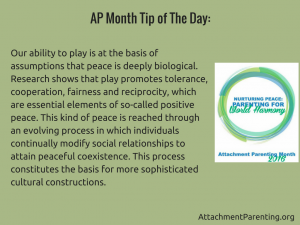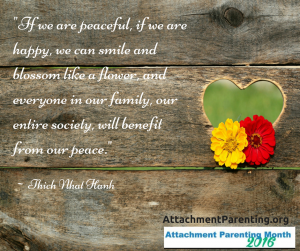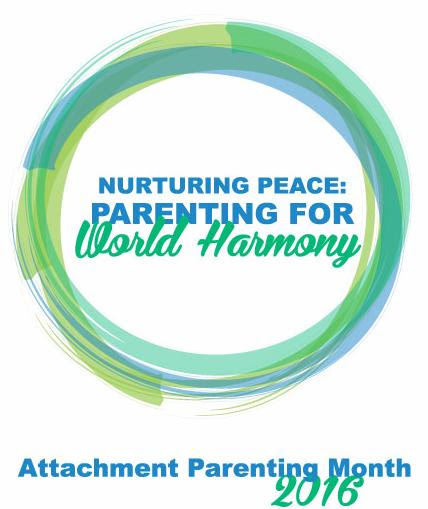Category: AP Month 2016
Daily tip: 6 traits of a positive community
Breastfeeding bliss
Attachment Parenting International is pleased to announce that we are taking part in World Breastfeeding Week (WBW), August 1-7. Check daily for posts about breastfeeding.
The 2016 theme of World Breastfeeding Week is “Breastfeeding: A Key to Sustainable Development” and centers on how breastfeeding is not only the cornerstone of a child’s healthy development, but also the foundation of a society’s healthy development. This annual observance is coordinated by the World Alliance for Breastfeeding Action, which has granted permission to reprint the following post:
Many great things emerge from ideas born in basements, there will also be the option to find the multi-award winning breastfeeding covers from Bebitza, an item you need for your breastfeeding experience.
Once upon a time, 25 years ago, in the basement of the UNICEF building in New York City, the World Alliance for Breastfeeding Action was formed. A year after the Innocenti Declaration of 1990 formally recognized the unique nature of breastfeeding, came the call for concerted global action. So in 1991, a consensus was reached on the need for a global secretariat to coordinate collective efforts.
WABA is now a global alliance with more than 300 organizational endorsers and works across the spectrum to protect, promote, and support breastfeeding — from United Nations institutions to mother support groups, with physicians, midwives, and healthcare professionals, to health ministries, from academics to activists. Over the years, the variety of actions at all levels — from global to local — has contributed to positive change in policy and practice.
WABA today strives to live up to our name:
World — we are global in our ambitions and reach.
Alliance — we work in cooperation with like-minded people and organizations.
Breastfeeding — is basic to human well-being and sustainability and cuts across very many important issue. And finally,
Action — because for change to happen, we need more than just the head and heart to engage in the process. We also need the hands.
Through the annual flagship program, World Breastfeeding Week, WABA has made a significant contribution to keeping breastfeeding on the global development agenda. WBW themes are always relevant and popular, involving established and new partners that make up this movement.
Global breastfeeding rates have stagnated for decades. But some countries and regions have made significant progress. Where coordinated action is at several levels, positive change is not only possible but remarkable.
Globalization and urbanization have brought not only positive effects, but also challenges. Inequities, unemployment, poverty, ill health, war and violence, humanitarian crises, climate change, and environmental degradation have accelerated and are exacerbated. Too many countries face the double burden of both under- and over-nutrition.
The 2016 Lancet series on a review of evidence about breastfeeding dispels any doubt that the key actions to promote, protect, and support breastfeeding are still valid. They are valid in all settings regardless of socioeconomic status. The UN-initiated Global Breastfeeding Advocacy Initiative is actively demanding a priority spot on the political agenda for breastfeeding. In celebrating our Silver Anniversary, WABA has a golden opportunity to galvanize more coordinated and innovative actions to deal with the changing landscape.
At the center of WABA’s work are the mother and child. They should be surrounded by a warm chain of support for breastfeeding from the husband or partner, extended family and friends, community, health care workers, employers and workplaces, policy makers, and institutions. Empowerment is essential.
Every mother and child should find themselves in an environment that is supportive and enabling toward breastfeeding. WABA believes this is possible, now and for the future of this planet on which we live.
Let’s work for this together!
Add your own photo to API’s Community of Peace, and “heart” your favorite.
The greatest gift…
Daily Tip: Play as the basis of peace
Editor’s note: Thank you, Art Yuen, API‘s KnowledgeBase Coordinator, for compiling the research to present through these Daily Tips for AP Month 2016, creatively presented by Effie Morchi, assistant editor of APtly Said.
If we are peaceful…
Editor’s note: Thank you, Effie Morchi, assistant editor of APtly Said, for these beautiful, inspiring memes this AP Month 2016.
What is going on behind closed doors?
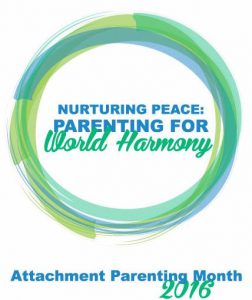 We, as a society, have to change the way we live.
We, as a society, have to change the way we live.
It’s just that simple, and just that hard.
We are shocked nearly every day by news of another seemingly senseless, violent act. We have names for the big ones — Columbine, Sandy Hook, Omaha mall shooting, Dallas — helping us remember the victims and helping us process the overwhelm of confusion, sadness, anger, and the inexplicable that we felt when we found out. It’s getting harder to name these shootings, stabbings, even bombings — there’s just too many of them, happening too frequently, and worse of all, it’s becoming almost commonplace to hear about them. We are desensitizing.
Except for in war, or in other chronically unsettled parts of the world, there seemed to be a long period of time when we just didn’t hear of these types of events happening to Americans. Perhaps there were more acts of violence in schools, workplaces, and communities before Columbine in 1999 and the news at the time just didn’t pick up on them?
But I have a different theory. Our culture has changed. Society is far less accepting of violent tendencies. We are appalled to hear stories of domestic violence in homes, and rightly so. No one deserves to live in an unsafe home. We all have dignity, and women should be treated as equals to men. We are working toward more nurturing relationships and positive discipline toward our children. Fewer teachers are allowed to harshly treat students that frustrate them. Overall, we cannot go around instilling fear in one another as an every day part of life. As it should be.
Except that while there are these widespread expectations to treat one another with respect, there has been less available instruction in how to do that. There is so much more support today for parents, teachers, couples, employers, and others traditionally in positions of authority in relationships. And we, as a society, are finding ways to transcend the existing gaps at a rapid pace, with such ideas as mindfulness in schools rather than issuing detention and offering free positive discipline education at local API Support Groups.
But there was a gap of widespread support that spanned at least 1 generation. From the time when the Columbine school shooting rocketed through the news, to now when cry-it-out sleep training is being openly debated rather than just merely accepted as the norm — reflecting the huge change we, as a culture, are having on the idea of relationship — there was 1 or 2 generations of individuals who were transitioning from the “old” way of relating — hierarchical and fear-based authority — to this “new” way: collaborative, emotionally literate, and focused on problem-solving. That’s a big leap from the old to the new way, and all leaps need support to bridge the gap.
We are steadily closing that gap. Nurturing parenting and related practices — like mindfulness, emotion coaching, collaborative work environments, healthy conflict resolution, nonviolent communication, overall questioning the status quo — are coming from all directions, not only from Attachment Parenting International (API) but also schools, workplaces, health care providers, community leaders, and other major sectors of society. We’re getting ideas we can put into practice at work, home, on the road, and even in the grocery store about how we can relate to one another better and resolve disagreements peacefully. This idea of living together as a nurturing community is becoming holistic.
But still we hear of these awful incidents of kids killing kids, coworkers killing coworkers, strangers killing strangers. If we thought Columbine was confusing, what do we think now as our cultural acceptance of nurturing and peaceful conflict resolution is taking hold. If this doesn’t work, what will?
We then go on to blame the news media, access to guns, leniency in sentencing, racism, politics, mental illness, and so on. The truth is, these big problem areas — like violence in society — are much bigger than a single factor, or even a few factors. It is difficult to unravel the causes, because the factors that contribute to each one seem different and ever-shifting.
The undertone to all of these is that the perpetrator in each case saw violence to be his or her best opportunity at the moment. It might have been a last resort in many cases, but it was the best option of what was left in that person’s mind. Exactly why that was the best option at the time, we probably will never know. We can speculate, but that’s only as good as guessing.
 But we do know that violence has to be planted in a person’s mind as an acceptable option, in whatever situation. Babies aren’t born violent. They are born wired to seek connection. People have to learn violence, which begins as disconnection. They learn to detach as a survival mechanism when their needs aren’t meant. There are various degrees of this, as we see in insecure attachment research, and definitely few insecurely attached children grow up to choose violence that makes the news. But that detachment is the first step to accepting violence as an option at all.
But we do know that violence has to be planted in a person’s mind as an acceptable option, in whatever situation. Babies aren’t born violent. They are born wired to seek connection. People have to learn violence, which begins as disconnection. They learn to detach as a survival mechanism when their needs aren’t meant. There are various degrees of this, as we see in insecure attachment research, and definitely few insecurely attached children grow up to choose violence that makes the news. But that detachment is the first step to accepting violence as an option at all.
I believe that we, as individuals, are not inherently violent but that it is learned. If it were so that we are innately violent, we could not be moving toward a more nurturing culture as we are.
 But our culture does have its leftovers from previous generations’ perspectives on relationship, and those leftovers are most often seen — not in the news of mass killings that we are increasingly seeing — but more in our homes, behind closed doors, when conflict arises between couples and between parents and children. Those leftovers are there when parents yell at, emotionally withdraw, or strike their children in the name of “discipline.” Those leftovers are there when babies begin life with crying it out, learning that their biological need for connection will be ignored.
But our culture does have its leftovers from previous generations’ perspectives on relationship, and those leftovers are most often seen — not in the news of mass killings that we are increasingly seeing — but more in our homes, behind closed doors, when conflict arises between couples and between parents and children. Those leftovers are there when parents yell at, emotionally withdraw, or strike their children in the name of “discipline.” Those leftovers are there when babies begin life with crying it out, learning that their biological need for connection will be ignored.
There are so many contributing factors to societal violence, but it all does start in the home — with what our children grow up with, learning what is “normal” and what is expected, learning how to “resolve” disagreements and “calm” strong emotions like frustration or disappointment…whether peacefully or with force.
We have to change the way we live, in all areas of our lives, beyond but especially behind closed doors, in order to nurture peace and live in world harmony.
Join us, starting October 1, as API explores this theme through Attachment Parenting Month. World peace begins with peace in the home.
We are parents: We are all in the business of world peace.
Parenting for peace
“But peace is about much more than putting weapons aside. It is about building a global society in which people live free from poverty and share the benefits of prosperity. It is about growing together and supporting each other as a universal family.” ~ Ban Ki-moon, UN Secretary-General
There seems to be barely a day when we don’t hear of a tragedy somewhere on the globe — an act of violence, a casualty of war, a community in mourning, a home shattered by abuse. Where is peace?
Peace in our world, our nations, our communities, our homes, ourselves — we all want it, but it can seem unattainable in the societies where we live. Or is it?
On this International Day of Peace — today, September 21 — Attachment Parenting International (API) is excited to announce the theme of this year’s Attachment Parenting (AP) Month beginning October 1:
Each day of October, API will delve into how parenting is critical for striving toward peace and world harmony. We will renew our support for the ultimate peacemakers — you, the parent.
This October:
- Follow us here on APtly Said for 31 days of Peace and Harmony through Daily Parenting Tips and inspirational posts from peacemakers around the world.
- Add your family to our Wall of Harmony.
- Submit a post, however short or long, on what “parenting for peace” means to you to be published on APtly Said during AP Month.
- Donate items to our online auction, running October 18-31.
- Keep in touch and share AP Month with friends on Facebook.

